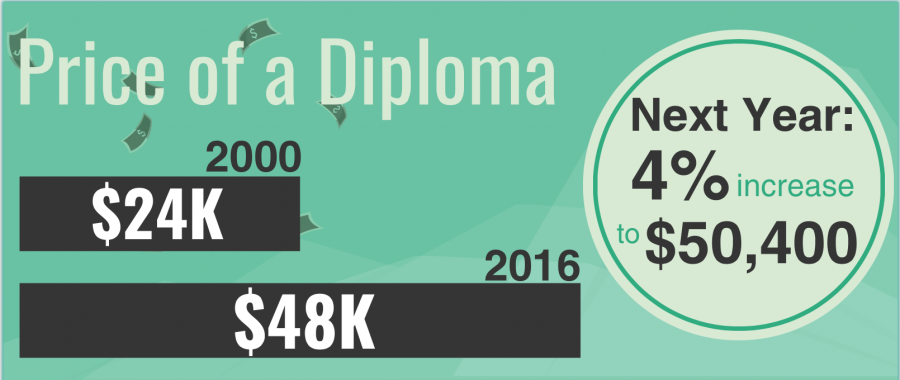The annual price of a Lafayette degree, without room, board and fees, will rise above $50,000 for the next academic year. Just 16 years ago, the price was half as much.
The 4-percent increase is generally consistent with increases since the economy stabilized in 2011. Since 2000, the tuition has increased at an average of 4.5 percent per year.
A variety of factors pushed the tuition up 4 percent on last year, the college said, including Lafayette’s standing compared to other schools and the ability to address emerging needs. Vice President for Finance Roger Demareski said there is also a balance between fixed tuition for every student and variables like room and board and dining fees that students will differ on.
“We might say, ‘Our tuition is 42 [thousand] but somebody else’s is 35,” Demareski said, “but the overall cost of attendance for us is less, because they build it up elsewhere.”
Including room, board and other fees, the increase brings the typical total cost of attendance to $65,890, a 2.3 percent increase on last year.
“There is pressure to add services that today’s customer wants,” Demareski said. “There are some people who correlate quality with cost. Is a school that is more expensive a better school? I don’t think so, but there is that correlation of ‘I’m getting more because I’m paying more.'”

The college promised last year to devote one percentage point of each tuition increase to financial aid. Since then, tuition has increased about 4 percent, a percentage point higher than 2015, but on par with the few years prior.
The one percentage point contribution to the campaign toward need-blindness composes a fifth of the effort toward the financial aid budget. Other parts come from reallocation of merit aid, additional revenue from 400 more students, and two donation campaigns.
The net cost of tuition is typically less than the sticker price due to merit, athletic and need-based aid. On average, a Lafayette student pays 35 percent less than the sticker price, according to college officials.
When the board of trustees approved the tuition increase, they also approved salary pool increases for faculty and staff. The money devoted to faculty salaries would get a 3.5 percent boost, and the staff pool would receive a 2.5 percent boost. Last year, the figures were 4 percent and 3 percent, respectively, to make Lafayette a more competitive employer, according to Demareski.
The board passed a debt strategy to fund the construction of the Integrated Science Center, which plans to break ground in June. The total project will be billed as $75 million. A donation campaign will fund $30 million, a donation received three-and-a-half years ago will fund $25 million and $20 million will be held in debt.
The college is still exploring how it will fund the new residence hall on McCartney Street. They plan to either issue college debt or use the developer’s equity.
The board also approved a five-year extension of President Alison Byerly’s contract and the plan to create and renovate the Max Kade House for German Studies and Visiting Scholars with a $600,000 grant from the Max Kade Foundation.


























































































































sdf • Mar 9, 2017 at 6:11 pm
Staff did NOT earn a 3% raise last year. The information you received is either a lie or a typo.
Ian • Mar 10, 2017 at 2:03 pm
He said the “salary pool” – it may not have been distributed evenly